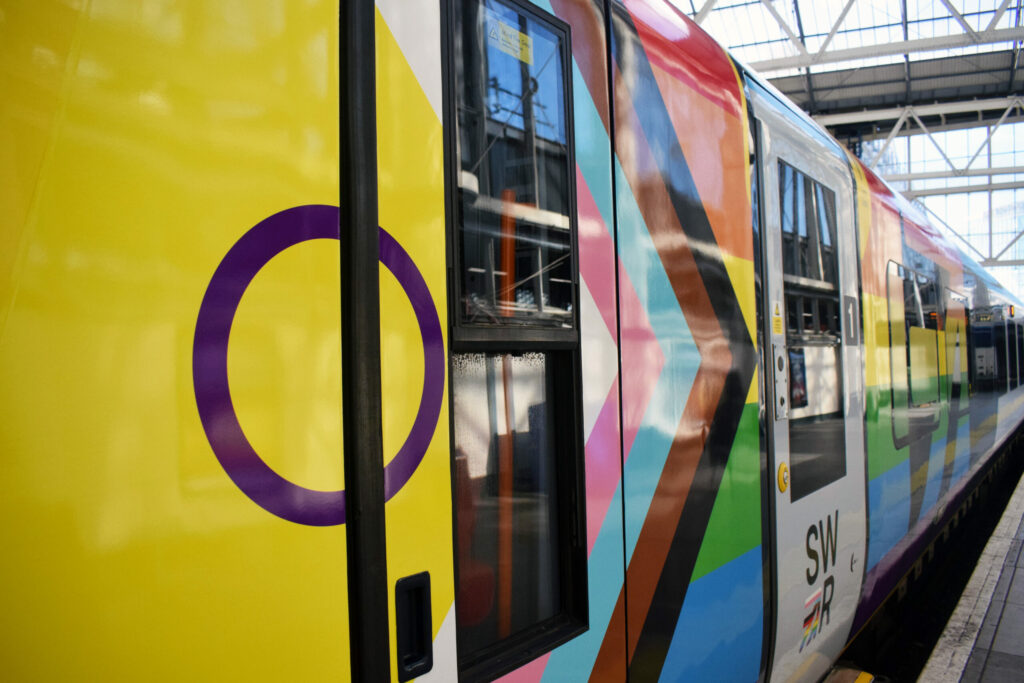Stuart Meek is the chief operating officer (COO) at South Western Railway (SWR). He is passionate about making real improvements in Equality, Diversity, and Inclusion (EDI) at the company and throughout the industry as a whole. We spoke to Stuart about the practicalities and challenges of delivering a solid EDI policy, and the progress that Rail is making to ensure all staff and passengers feel welcomed, accepted, and safe.
Could you tell us about your role at SWR and your efforts to enhance EDI within the organisation?
Stuart: As the COO of SWR, I have the privilege of being responsible for the delivery side of the business, including stations, control, drivers, on-train staff, resourcing, operational standards, planning, performance, resilience, and customer contact in the organisation. As a leader of so many people – more than 3,000 – I have a responsibility to make it a good place to work for everyone. That responsibility includes giving some of the power that my position provides me to groups of colleagues that have faced a lack of representation, to level things up – something I take very seriously. The need for this is stark when you look at the data on minority representation in rail.
I came to SWR with a view to making it a truly inclusive place for staff and for customers too. That really is our mission and we’re determined to make SWR one of the most inclusive large organisations in the UK.
When I started working at SWR nine months ago, it already had very well-established employee networks. They have strong memberships and discuss important social and policy issues, along with offering support and advocacy for members. In my time here, I’ve tweaked those a little, making their operations a little slicker, and that’s been quite successful. I’m also leading the overhaul of our recruitment process.

Talking about recruitment, how does that fit into a good EDI policy?
Stuart: EDI starts with the recruitment process; it is the foundation. Any business with a solid EDI policy must practice what it preaches when attracting new talent and recruiting new colleagues. We need everyday decisions to be made by a diverse range of people to get the best outcomes – diverse teams are the best teams. We must also consider the longer term too; if you’re bringing people into the business who are – or go on to become – managers, they are important decision-makers in their own right, so it has a multiplier effect.
It can’t stop at recruitment though. It’s no good to bring people into an organisation and expect them to ‘fit in’ – we need people to stand out! People need supporting and their diversity needs to be actively celebrated. This does not just apply to minority groups – it applies to anyone who thinks a bit differently. The railway industry has been criticised for being stuck in its ways in the past so genuine diversity of thought can truly benefit us.
How do companies avoid making EDI a box-ticking exercise rather than a real commitment to change?
Stuart: Words are cheap! A lot of companies talk about EDI and although it’s great that it has become part of the conversation, you should be evaluated on your actions. For example, a lot of companies publicly celebrate pride and of course it’s really positive that they’re getting involved but that needs following through with actions to make sure things are inclusive for employees and customers.
Our Pride Train, for example, wasn’t created by our marketing department or PR team, and it wasn’t dreamt up by our executive board. It was the product of our internal pride network, which is made up of frontline colleagues from across the business, and we support them in following through on that.
Whilst a key part of EDI is about the positive promotion (like the Pride Train, or Black History Month, for example), but it is also about the actions we take to tackle issues head-on. In the workplace, management teams must always respond to any issues around EDI appropriately. Quite simply, we need to take a ‘zero tolerance approach’. SWR is a wonderful, kind, and collaborative organisation. We tend to discuss things and push decisions towards the frontline where we can, but EDI (as with safety) really is a ‘non-negotiable’. Whenever an issue around EDI comes up, it must be acted upon. We have a great diversity and inclusion team at SWR that create the strategy and champion issues, but it’s everyone’s responsibility to bring it to life.
The word ‘woke’ has come into increased use in the past few years. What do you make of commentators who describe efforts to enhance EDI as ‘wokeness’?
Stuart: We saw a little bit of this with the inter-sex inclusive Pride Train that we launched in March to show support and solidarity with LGBTQ+ customers and colleagues. It’s absolutely wonderful and we’re so proud of it. The reception to the train was overwhelmingly positive but, of course, there were a few commentators who questioned our motives around it, and a few accusations of ‘wokeness’.
The reason initiatives such as the Pride Train are important is because they show colleagues that we support them. It was developed by our Pride employee network because to its members – our colleagues – this is really important. It also shows customers that we are an inclusive organisation. That train goes up and down our main line and will get seen by millions of people. Sadly, we have had some incidents of homophobic and transphobic abuse against our staff, and we will do whatever we can to eliminate this – is that really ‘woke’?
I ban the word ‘woke’ in the workplace. I try to replace it with the word ‘kind’. Some people find it very difficult to scale the issues at hand, and often say ‘you’re taking it too far’. That’s open to opinion, but when people say it, I tend to see that as an invitation to start a conversation about the issues, which is great in itself.

What role do training programmes take in maintaining a sound EDI policy within a company? How effective are such programmes?
Stuart: SWR runs programmes for unconscious bias and we’re rolling out a new eLearning module to all managers on inclusivity. We also host a range of webinars which employees can sign into remotely. Like most organisations, we roll out these types of programmes across the business, especially to management because of their decision making responsibilities within the business.
It’s important to do these things, but it’s also important to remember that it’s not a fire and forget exercise. Just because you’ve provided training, you can’t tick it off the list as a job you’ve completed. You’ve got to continually look in detail at what’s happening within the organisation, what decisions are being made, and what activities are taking place. Importantly, that involves listening to the voices of the unrepresented groups (our reverse mentoring scheme is a great opportunity for this).
It goes back to box ticking and virtue signalling. It’s all well and good discussing EDI but if you don’t act on these conversations, you don’t make any progress. And if you can’t see any positive results of your policy – how the changes you’re making are benefiting the communities they’re aimed at – then your EDI policy probably isn’t working.
Overall, how successfully do you think the rail industry handles EDI? What progress has been made in recent years and what more is there to do?
Stuart: Rail is doing a great deal to promote and enhance EDI, and I think that trade unions have offered a lot of support in this space. Internally, we’re on a journey that is really positive and network groups are now commonplace in the industry, which is fantastic. Overt discrimination is thankfully rare and we have raised the bar in terms of what is acceptable. Yet, it is not zero everywhere, so our EDI work needs push on. For example, I think that some of the policies that we’ve got as an industry are quite old fashioned and we need to work on that.
I believe that the industry has a very important societal role. Rail provides a public service and, as such, we need to ensure we provide a safe and inclusive space for everyone who uses it. We need to represent the communities that we serve and think about how minority and marginalised groups feel when they are using the train. Hate crime certainly still exists and is actually not declining in some areas. We have got a really important role in tackling this. I take this responsibility very seriously.
We have to make the rail network safe, and feel safe, for anybody who uses it, regardless of their ethnicity, religion, gender identity, sexuality or disability. As an industry with a real societal role, rail needs to come together to address these issues. Everyone is welcome on our trains – all aboard!
Image credit: SWR

